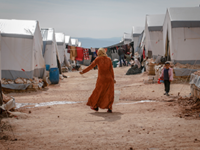DBS checks are available for asylum seekers and refugees, although securing the required forms of identification can cause difficulties for recruiters. For those who are not UK citizens, options for identification documents include a biometric residence permit, a passport, or a UK driving licence card showing the holder’s photograph. Many people who are going through the asylum process have none of these official proofs of identity.
However, cases where these identification documents are unavailable does not mean a DBS certificate cannot be obtained. In these cases where the applicant has no documents, the DBS can instead verify who they are through fingerprinting. As this step is in addition to the standard DBS process, it will take longer than a check for someone with ID documents.
DBS Check Eligibility for Non-UK Citizens
People who are not British citizens can qualify for a DBS check, provided they have the legal rights to work in the UK. However, the level of DBS check which they might be eligible for will depend on the role they are being considered for. The same rules about whether someone can have a DBS check are that they:
- Are in the UK legally and have the right to work here.
- Are 16 years old, or older as a minimum.
- For a standard or enhanced check, that the work being undertaken is in a position of trust, or working with vulnerable groups such as children, or adults with disabilities.
Alternatives to Fingerprint Checks
Understandably, undergoing fingerprinting can be an unnerving experience, particularly for people who have come to the UK in traumatic situations. If asylum seekers wish to avoid having their prints taken, there is an alternative route. This is an option for people who only have one of the key identification documents such as driving licence or passport, but not others.
Opting for Fingerprint-Based DBS Checks
Fingerprint-based DBS checks might be the only option for asylum seekers or refugees who cannot provide any trusted ID documents to their employer. The employer triggers the fingerprinting process by indicating on the application for that the person under consideration does not have the required documents and wishes to use the fingerprinting route. The DBS then writes to the applicant, asking for their consent to having their prints taken. The applicant signs the letter and returns it to the DBS, attaching passport photos for identity verification. The local police then arranged an appointment with the individual to check their prints to be checked against the police database.
Overseas Checks
Depending on the role being applied for and the length of time the person has been in the UK, they may also have to obtain a police certificate or statement of good character from the country where they lived before entering the UK. This is an entirely different process and can be time-consuming and difficult for someone who has fled their home and no longer wishes to have any contact with official authorities in the country where they were born. Specialist advice is often required.





